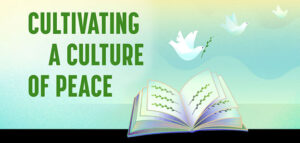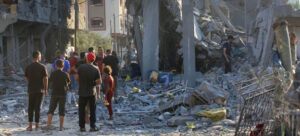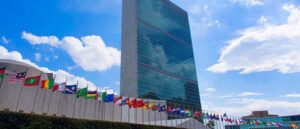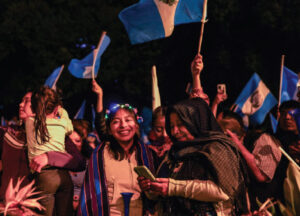
Civil Society, Democracy, Education, Featured, Global, Global Governance, Headlines, Human Rights, IPS UN: Inside the Glasshouse, Peace, TerraViva United Nations

– This opinion piece is being published exactly on the date when twenty-five years ago today the UN took its most forward-looking stride in ensuring a peaceful planet for all of us since the signing of the Charter of the United Nations in 1945.
The UN Charter arose out of the ashes of the Second World War and the UN Declaration and the Programme of Action on a Culture of Peace emerged in the aftermath of the long-drawn Cold War.
On this very day, the United Nations adopted by consensus and without reservation a monumental document on the Culture of Peace that transcends boundaries, cultures, societies, and nations.
Arduous journey
It was an honour for me to Chair the nine-month long open-ended negotiations that led to the agreement on that historic norm-setting document which is considered as one of the most significant legacies of the United Nations that would endure generations.
I introduced the agreed text of that document (A/RES/53/243) on behalf of all Member States for adoption by the Assembly with its President Didier Opertti of Uruguay chairing the meeting. Through this landmark adoption, the General Assembly laid down humanity’s charter for the new approaching millennium.

Ambassador Anwarul K. Chowdhury
This document explains, outlines, and defines everything that the international community has agreed on as the focus of the culture of peace. I would always treasure and cherish the opportunity to lead the process in its adoption and in its subsequent advocacy.
For me this has been a realization of my personal commitment to peace and my humble contribution to humanity. For more than two and a half decades, my focus has been on advancing the culture of peace and I have continued to devote considerable time, energy, and effort to do that.
It has been a long, arduous journey – a journey ridden curiously with both obstacles and indifference. Since July 1997, when I took the initiative to write to our much-loved and highly respected Secretary-General Kofi Annan to create a separate item of agenda of the General Assembly, the path and progress of the culture of peace at UN have been uneven to say the least. For being a part of this journey, I pay tribute to Bangladeshi diplomats who have been true co-travellers.
My life’s experience has taught me to value peace and equality as the essential components of our existence. They unleash the positive forces of good that are so needed for human progress. It is essential to remember that the culture of peace requires a change of our hearts, change of our mindset.
The objective of the culture of peace is the empowerment of people. We should not isolate peace as something separate. It is important to realize that the absence of peace takes away the opportunities that we need to better ourselves, to prepare ourselves, to empower ourselves to face the challenges of our lives, individually and collectively.
Transformation is the essence
The essence of the culture of peace is its message of self-transformation and its message of inclusiveness, of global solidarity, of the oneness of humanity. These elements—individual and global, individual to global—constitute the way forward for the culture of peace.
‘Transformation’ is of the most essential relevance here. The Programme of Action identifies eight specific areas which encourage actions at all levels – the individual, the family, the community, the national, the regional and, of course, the global levels.
Though the Declaration and Programme of Action is an agreement among nations, governments, civil society, media, and individuals are all identified in this document as key actors.
The culture of peace begins with each one of us – unless we are ready to integrate peace and non-violence as part of our daily existence, we cannot expect our communities, our nations, our planet to be peaceful. We should be prepared and confident in resolving the challenges of our lives in a non-aggressive manner. In today’s world, more so, the humanity’s creed should be based on inner oneness and outer diversity.
Enhancing Member States engagement
To accord an enhanced profile to the concept of the culture of peace, since 2012, successive UN General Assembly Presidents convened an annual UN High Level Forum on The Culture of Peace to provide an inclusive, participatory platform for UN Member States, civil society, media, private sector and other interested parties to exchange ideas on the implementation of the Declaration and Programme of Action.
Since 2012, when the first UN High Level Forum was convened by the President of the 66th Session of the General Assembly Ambassador Nassir Al-Nasser, the UNGA mandated this annual Forum as “an opportunity for renewing the commitments to strengthen further the global movement for the culture of peace.”
At the global level, the Global Movement for The Culture of Peace (GMCoP), a coalition of civil society organizations, have been spearheading advocacy initiatives effectively since 2011 as well as in organizing the annual High-Level Forums on The Culture of Peace convened by the President of UN General Assembly.
Peace and Culture of Peace
Many treat peace and culture of peace synonymously. When we speak of peace, we expect others namely politicians, diplomats, or other practitioners to take the initiative while when we speak of the culture of peace, we know that initial action begins with each one of us.
SDGs and the Culture of Peace
The UN General Assembly decided on the culture of peace before the Millennium Development Goals. SDGs came 15 years later. Many would recall that Goal 16 – the so-called peace goal – was almost dropped when the developing countries wanted to include a reference to the culture of peace.
A compromise excluded it so that the negotiated Goal 16 could be agreed without it. Bangladesh brought the reference to the culture of peace in Goal 4 in its target 4.7 which identified culture of peace and non-violence as well as global citizenship in educational context.
All eight areas of action in the culture of peace programme are reflected in various SDGs. I can however say with pride that the Culture of Peace would outlast the SDGs and make more deep-rooted and longer-lasting contribution to a sustainable and peaceful planet of ours when the UN observes the 30th anniversary of The Culture of Peace.
Let me end by outlining the three integrated mainstream for the coming years bolstering the global movement for the culture of peace.
Education for global citizenship
Number one: education. All educational institutions need to offer opportunities that prepare the students not only to live fulfilling lives but also to be responsible and productive citizens of the world. This should more appropriately be called “education for global citizenship”. If our minds could be likened to a computer, then education provides the software with which to “reboot” our priorities and actions for transition from force to reason, from conflict to dialogue.
Equality of women’s participation
Number two: women. As I always say emphatically –
“Without peace, development cannot be realized, without development, peace is not achievable, but without women, neither peace nor development is possible.”
Youth and children
And number three: youth and children. It is essential to recognize the empowerment of young people as a major element in building the culture of peace. Young people of today should embrace the culture of peace in a way that can not only shape their lives but can also shape the future of the world.
For this, I believe that early childhood affords a window of opportunity for us to sow the seeds of transition to the culture of peace from an early life.
Way forward
As former Secretary-General of the United Nations and Nobel Peace laureate Kofi Annan had profoundly said, “Over the years we have come to realize that it is not enough to send peacekeeping forces to separate warring parties. It is not enough to engage in peace-building efforts after societies have been ravaged by conflict. It is not enough to conduct preventive diplomacy. All of this is essential work, but we want enduring results. We need, in short, the culture of peace.”
How do we build and promote the culture of peace? To turn the culture of peace into a global, universal movement, the most crucial element that is needed is for every one of us to be a true believer in peace and non-violence. A lot can be achieved in promoting the culture of peace through individual resolve and action.
By immersing ourselves in a culture that supports and promotes peace, individual efforts will–over time–combine and unite, and peace, security and sustainability will emerge. This is the only way we shall achieve a just and sustainable peace in the world.
The culture of peace is not a quick fix. It is a movement, not a revolution.
The seed of peace exists in all of us. It must be nurtured, cared for and promoted by us all to flourish. Peace cannot be imposed from outside – it must be realized from within.
Ambassador Anwarul K. Chowdhury, is Former Permanent Representative of Bangladesh to the UN; President of the UN Security Council (2000 and 2001); Senior Special Adviser to UN General Assembly President (2011-2012) and Former Under-Secretary-General and High Representative of the UN.
IPS UN Bureau






 What are the main constitutional changes and why have the political opposition and civil society objected to them?
What are the main constitutional changes and why have the political opposition and civil society objected to them?


